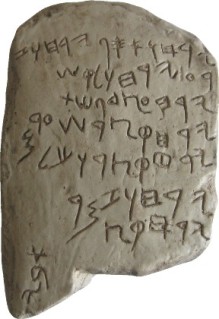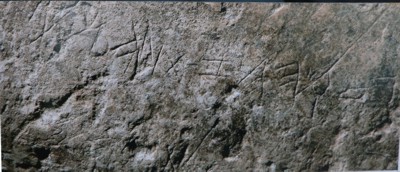Did the Hebrew language exist before the exile into Babylon?
 I received a comment on my blog claiming that the Hebrew language didn’t exist until the Jewish exile in Babylon. So, what does the evidence say?
I received a comment on my blog claiming that the Hebrew language didn’t exist until the Jewish exile in Babylon. So, what does the evidence say?
According to the Bible, all people spoke the same language until around 2200 BC when God caused different languages to develop at Babel and people scattered to form different nations across the earth (Gen. 11:1-9). This was the source of the diversity of human languages.
The Hebrew nation settled in Canaan in the 14th century BC. They occupied Canaan until the first Jewish captives were deported to Babylon in 605 BC and the second wave were exiled in 586 BC when the city of Jerusalem was destroyed (Dan. 1; 2 Ki. 25).
 According to Wikipedia, the Siloam inscription records the construction of Hezekiah’s tunnel. The NIV Study Bible states that Hezekiah was king of Judah between 715 BC and 686 BC (2 Ki. 18:1-2). The tunnel, leading from the Gihon Spring to the Pool of Siloam, was designed as an aqueduct to provide Jerusalem with water during an impending siege by the Assyrians, led by Sennacherib (2 Ki. 20:20; 2 Chr. 32:30). The inscription, which was discovered in the tunnel in 1880 and has been dated at 701 BC, is written in the “Biblical Hebrew” language, which uses the ancient Hebrew alphabet. So here we have a written example of the Hebrew language that dates at least 100 years before the Jewish exile.
According to Wikipedia, the Siloam inscription records the construction of Hezekiah’s tunnel. The NIV Study Bible states that Hezekiah was king of Judah between 715 BC and 686 BC (2 Ki. 18:1-2). The tunnel, leading from the Gihon Spring to the Pool of Siloam, was designed as an aqueduct to provide Jerusalem with water during an impending siege by the Assyrians, led by Sennacherib (2 Ki. 20:20; 2 Chr. 32:30). The inscription, which was discovered in the tunnel in 1880 and has been dated at 701 BC, is written in the “Biblical Hebrew” language, which uses the ancient Hebrew alphabet. So here we have a written example of the Hebrew language that dates at least 100 years before the Jewish exile.
Hebrew belongs to the Semantic family of languages which were used in the middle east. Geographically it was a Canaanite language like Phoenician, Ugaritic and Moabite. The Bible notes that Jacob’s language was different to Aramaic (Gen. 31:47). Scholars believe that Hebrew was spoken in the kingdoms of Israel and Judah during the 10th to 7th centuries BC.
 Therefore, the reader’s comment seems to be inconsistent with the evidence available. It can be shown that the Hebrew language originated well before the Babylonian exile. In fact, Wikipedia claims that there is evidence of “Biblical Hebrew” as far back as the 10th century BC, which extends to the days of king David (2 Sam. 5:4). The Gezer calendar is dated in this time period. Likewise, the earliest known example of the Hebrew alphabet discovered at Tel Zayit is dated in the 10th century B.C.
Therefore, the reader’s comment seems to be inconsistent with the evidence available. It can be shown that the Hebrew language originated well before the Babylonian exile. In fact, Wikipedia claims that there is evidence of “Biblical Hebrew” as far back as the 10th century BC, which extends to the days of king David (2 Sam. 5:4). The Gezer calendar is dated in this time period. Likewise, the earliest known example of the Hebrew alphabet discovered at Tel Zayit is dated in the 10th century B.C.
Written, March 2013






There is no language call Hebrew what so ever. No archeologists ever found a peace of pottery, no trace of language or bones and eider human, no past and no present call Hebrew in the ancient time. The word Hebrew is originate with the jewish who call themselves Eber the son of Peleg or axphaxed. Presently jews language is YIDDISH; origin of German language and Kazar from Kazaxtan and they know it. Get your history straight. They are all Europeans and divided between themselves. Judah, Jerusalem Bethlehem or else have never been there it was in Syria, Turkey Iran and all Middle East, Armenie, Azerbaijan, and part of Africa all the way to Somalia and Yemen. I have the map. Why do you think there is war all over these places.
LikeLike
July 19, 2017 at 6:03 pm
Thanks for the comment Betty.
Eber (Strongs #5677) was the great-grandson of Shem (Gen. 10:21-24; 11:10-14; 1 Chr. 1:17-18, 24-25). According to Brown-Driver-Briggs, the masculine name “Eber” is perhaps an eponym (a person from whom something, as a tribe, nation, or place, takes its name) of the word “Hebrew”. Eber’s importance as the ancestor of the Hebrews is hinted in the statement that “Shem was the ancestor of all the sons of Eber” (Gen. 10:21).
The Hebrew word “Ibri” (Strongs #5680) is translated “Hebrew”. It’s first occurrence in the Bible is when Abram is called “the Hebrew” (Gen. 14:13). Abram was the 6th generation after Eber (Gen. 11:16-26). The Egyptians called Joseph a Hebrew (Gen. 39:14, 17; 41:12) and Canaan was called “the land of the Hebrews” (Gen. 40:15). In the early Old Testament (OT) era, “Hebrew” refers to any descendant of Eber, while later in OT history “Hebrew” became a racial designation for God’s covenant people (Akers, 2012).
In the OT, the language used by the descendants of Eber is referred to as the “language of Judah” (2 Ki. 18:28; 2 Chr. 32:18; Neh. 13:24; Isa. 36:11, 13). We know that this language was Hebrew from the many inscriptions discovered in the land of Israel, including:
– Gezer calendar (10th Cent BC)
– Siloam inscription (about 700BC)
– Lachish ostraca (about 586BC), and
– The Dead Sea scrolls (200BC to 100AD)
It’s logical that the name of a people group is often used to describe their spoken and written language. For example, English is spoken in England and German is spoken in Germany. Therefore, the Hebrews used what we call the Hebrew language. Although the Hebrew language in the OT was written over a period of about 1,000 years (about 1430BC to 430BC), it’s language (grammar and vocabulary) is remarkably stable.
According to Wikipedia, “Yiddish was the language spoken by the largest number of Jews in the 1850s, but in 2008 the three most commonly spoken languages among Jews were English, modern Hebrew, and Russian—in that order”. Yiddish was spoken by Jews of Central and eastern Europe, but many of these lost their lives in the holocaust. It’s a hybrid of Hebrew and medieval German. And its alphabet is based on Hebrew characters.
So, I can’t find any evidence to support your statement that there is no language called Hebrew.
Akers (2012) What’s in a name? An examination of the usage of the term “Hebrew” in the Old Testament. JETS, 55/4, 685-696.
LikeLike
July 28, 2017 at 3:33 pm
I have been reminded that the case of Jacob and Laban’s agreement in Genesis 31:47 suggests that Hebrew was in use and distinct from Aramaic as early as the 20th century BC. Jacob named a monument of stones the Hebrew “Galeed” (Strong’s #1547) while Laban gave it the corresponding Aramaic title “Jegar-Sahadutha” (“heap of stones”) (Strong’s #3026).
LikeLike
August 28, 2017 at 2:33 pm
Betty Senatus, You are correct! I was wonder about the Germans, Assyrians, connection; do you have any idea is this true? I was reading an article on the German and Assyrian being one and the same people.
LikeLike
September 17, 2017 at 4:43 am